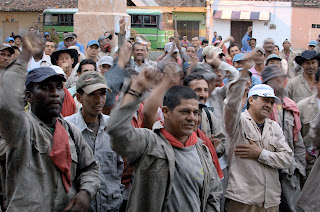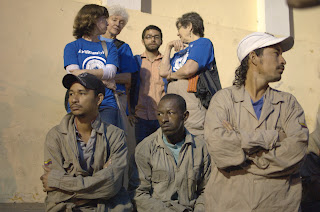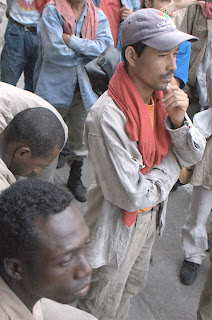
On day two, at 4 o'clock in the morning, it is still dark in Cali. Eager to start our delegation off strong, we pile into the van for our first official accompaniment: a union meeting held by the sugar cane cutters (coteros) in the town center of Yakari. As we drive through the lush Andean valley flanked by the central and western mountain ranges, I can see, in my minds eye, the massive swaths of monoculture made up of sugar cane.
These fields are where the sugar cane cutters, many of them of Afro-Colombian descent and indigenous men, who have fled from Nariño and Cauca where threats of violence are commonplace, toil in harsh conditions seven days a week. On average, the workers earn less than the national minimum wage while sugar cane refineries (ingenios) are reaping the benefits of a growing sector.
Since Colombia saw the success Brazil had with sugar cane based ethanol, President Uribe, who was in office from 2002-2010, and operated under a neo-liberal development model, passed an ethanol bill which gives tax incentives in free trade zones for ethanol production. Although the incentives supposedly had a two pronged economic rationale: to promote job growth and to avoid consequences of 'peak oil' (which Colombia reached close to two decades ago), the sugar cane workers have yet to see many benefits.
The fight for these benefits has not been without significant obstacles. On the bus ride to the union meeting, Alberto, who works with the sugar cane cutters union, explained the plight of these men and the labor organizers. Four years ago when the cutters went on strike to demand fair wages, direct contracts, and job stability along with other labor rights, they were repressed by the government. Four of the six strike supporters were accused of "conspiring to commit a crime, sabotage and inflicting harm" and that there was also a FARC (Colombia's armed leftist group - the guerillas) presence in the strike. In addition to the legal proceedings lingering for years, the legitimacy of sugar cane union and labor rights movement suffered because of these false accusations.

Although the sugar cane cutters and other historically exploited sectors have support in promoting thier labor rights under the "Labor Action Plan" (an agreement within the newly ratified Free Trade Agreement with the U.S.), the prevelant exploitation of labor goes virtually unpunished. Many of these workers still do not have direct contracts, fair wages, freedom from threats for organizing and job security, as directed under the Labor Action Plan.
In an effort to put pressure on the U.S. and Colombian government in addition to witnessing and standing in solidarity with the sugar cane cutters, our delegation arrived in our blue Witness for Peace t-shirts at the meeting in Yakari. It was still dark as the men gathered around the town square. They arrived in their tattered beige work clothes with red sweat rags around their necks. These rags have come to represent the corteros and are a powerful symbol of unity. In spite of a long day ahead of the men, they were enthusiastically rallying as union leaders and supporters encouraged them to keep fighting.

Our very own AFL-CIO sindicata, Jessica Hayssen from Minneapolis, Minnesota, delivered a message of solidarity backed by the workers in the states and across the globe who are in the struggle for labor rights. As I peered out into the crowd of battle-hardened faces, I saw glimpes of hope in the sugar cutters' eyes. The international attention is critical in helping them fight this battle.

As I stood with these men, I couldn't help but think about the women and children who are also in the fight along side thier husbands, fathers and brothers. Labor rights are not just about the workers. They affect families and families make up communities. The reality of the conditions faced by the workers directly impacts the health of thier communities.
Given the fact that most of the sugar produced in Colombia is for export and that the U.S. is seen as a lucrative market for sugar-cane based ethanol, we have an obligation to these workers. This obligation is not just for them, it is for the health of our global community. There is a saying in Spanish: "todos en la cama o todos en el piso," meaning if you're not part of the solution, you're part of the problem and that we are all in this together.

No comments:
Post a Comment